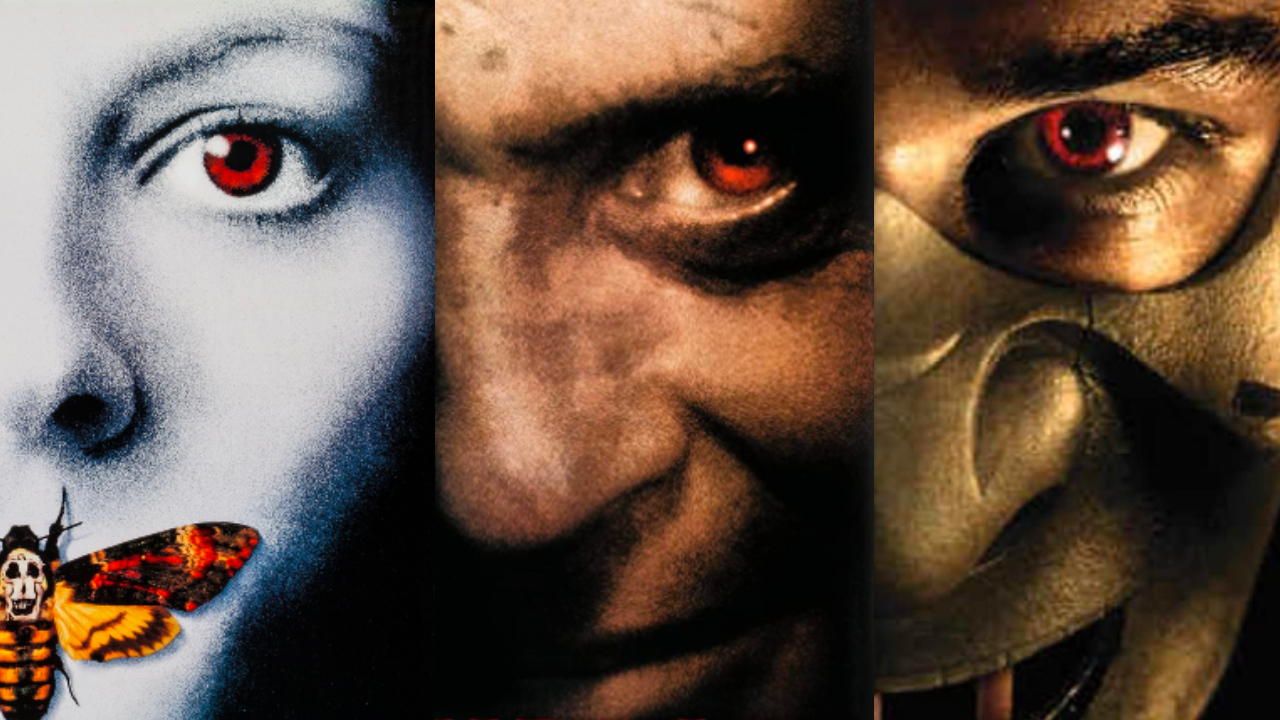Hannibal Lecter single-handedly transformed the cinematic serial killer. Before him, they were rubber-masked monsters; through Lecter, they evolved into masterminds able to psychologically toy with their prey. More than three decades after Anthony Hopkins made the cannibal formerly known as the Chesapeaker Ripper iconic in The Silence Of The Lambs, he remains the measuring stick for mass murderers in movies. To celebrate the impact of the chianti-sipping, liver and fava bean-eating psychiatrist, here’s every Hannibal Lecter screen adaptation ranked, from blockbusters to arthouse cult classics and even a whole TV show.

6. Hannibal Rising (2007)
Hannibal Lecter novelist Thomas Harris was essentially blackmailed into writing this prequel. Hannibal and Red Dragon producer Dino De Laurentiis claims he told the author, “If you don’t do [Rising], I will do it with someone else,” which forced into existence a reviled 2006 novel and an even more hated film adaptation the following year.
Harris penned the book Hannibal Rising and the film’s screenplay, both of which expand upon the cannibal’s backstory that the Hannibal novel whisked through. On screen, Gaspard Ulliel plays the young Lecter; at only 22 years old, he matches the menace and measure that defined Anthony Hopkins’ take on the character. However, that’s all that’s worth writing home about in this origin story, which is a dime-a-dozen revenge thriller depicting Lecter hunting down the Nazis that ate his sister. The narrative also reveals everything from Lecter’s childhood through to his arrival in the United States, meaning it subtracts much of the ambiguity that helped make the Chesapeake Ripper so chilling a decade and a half beforehand.
5. Hannibal (2001)
All hope for Hannibal died on June 8, 1999. That’s the day Thomas Harris released his long-awaited follow-up novel to The Silence Of The Lambs: a sequel that was widely derided for its insane story and nonsensical character development – and one that the next Lecter film had to centre itself around. The book depicted Clarice Starling falling in love with her serial killer tormentor, which turned Jodie Foster and director Jonathan Demme off so much that they declined to return.
Ultimately, Hannibal rejected the source novel’s out-of-character ending, but not even that was enough to save it from preposterousness. Lecter barges across the line from smart psychopath to supervillain, as he feeds his victims their own brains and publicly disembowels them while spewing one-liners. Director Ridley Scott also saps any semblance of subtlety, playing lion roars over cannibalistic kills and creating human faces out of flocks of pigeons for some reason. The performances from Hopkins, Foster fill-in Julianne Moore and newcomer Gary Oldman excel, although it’s all for naught in this otherwise cartoonish continuation.
4. Manhunter (1986)
It’s amazing that Manhunter isn’t talked about more. The first adaptation of Thomas Harris’s initial Hannibal Lecter novel, Red Dragon, was directed by Michael Mann: the master of crime dramas responsible for Thief, Heat and making Tom Cruise a baddie in Collateral. It also marks Lecter’s earliest cinematic appearance, played by Brian Cox, and may be the first serial killer thriller to emphasise the significance of forensic science.
However, upon release, Manhunter bombed while failing to wow film critics. Recent years have been kinder, though, and rightfully so. Cox’s Lecter is quick-talking and narcissistic, unlike the composure of Hopkins’, yet still vastly intelligent. William Petersen (now of CSI fame) portrays protagonist Will Graham as an FBI profiler so gifted that he threatens to march directly into psychopathy. Meanwhile, the music is a minimalist synth rock score, and murderer The Tooth Fairy frequently gets no soundtrack at all, as is befitting of the character’s quiet intensity. Although it’s low on this list, Manhunter is an alternate take on the Hannibal mythology that’ll reward the curious.
3. Red Dragon (2002)
After Hannibal proved hugely profitable but also a bit crap, husband-and-wife producers Dino and Martha De Laurentiis quickly decided to re-adapt Red Dragon, this time in the canon started by The Silence Of The Lambs. Brett Ratner – whom The Guardian contemporaneously lambasted as “a young journeyman of moderate skills” – was rushed into the director’s chair, with famous film hijacker Edward Norton playing Will Graham. It sounded like a recipe for disaster.
However, Red Dragon exceeded its predecessor and remains a worthwhile companion to Silence…. There are flaws, sure: the cinematography lacks the intimacy of Jonathan Demme’s classic, and The Tooth Fairy’s abusive upbringing and evil scrapbooking lean too heavily on killer cliches. At the same time, though, this is a far more loyal take on the Harris novel than Manhunter, dedicating more time to the tragedy of Francis Dolarhyde, dynamically realised by Ralph Fiennes. There’s also a careful balancing act with the Lecter scenes: despite there being more of them than in the book due to his post-Silence… popularity, he’s still employed just sparingly enough to maintain his mysteriousness.
2. Hannibal (2013–2015)
After Hannibal Rising bombed and got obliterated by the critics, interest in another Lecter film was at its lowest since the 1980s. Luckily, though, Game Of Thrones and Breaking Bad were ushering in an era of prestige television, and Harris’s books seemed perfect for a more long-form adaptation. Hannibal premiered on April 4, 2013, with critical acclaim quickly following.
Bryan Fuller’s three-season series returns to the deranged psychology at the heart of Red Dragon. Profiler extraordinaire Will Graham’s frangible relationship with sanity is the heart of the show, his fear, insecurities and brilliance all masterfully communicated by actor Hugh Dancy. Shadily toying with him all the while is Hannibal Lecter, this time portrayed by Mads Mikkelsen. Mikkelsen’s interpretation has the same coldness as Hopkins’, but also adds a sly, sarcastic humour to make the cannibal more believable in a world outside of his prison cell. Despite there being kills aplenty, it’s the psychology and interactions that make Hannibal one of the greatest TV series ever, so much so that its cancellation in 2015 still stings.
1. The Silence Of The Lambs (1991)
By 1991, cinema’s serial killers had become subhuman. The corpses of the previous decade’s horror landscape had been piled by the likes of Jason Voorhees and Freddy Krueger: monsters whose irredeemability was complemented by their hideousness. Then The Silence Of The Lambs made filmgoers vomit in the aisles by pushing the silver screen’s murderers in the opposite direction.
Hannibal Lecter is a cannibal that can destroy his victims not just physically, but also mentally. Anthony Hopkins portrays an upper class human being with dignity and gravitas, and, as a psychiatrist, the ability to manipulate his prey during their lowest lows – before he eats them. His verbal sparring with FBI trainee Clarice Starling, played by Jodie Foster, is the highlight of Jonathan Demme’s masterpiece. Their every interaction is carried by flawless performances and claustrophobic cinematography that only aggravates the suspense. Hopkins never even blinks on camera: a detail that works wonders in conveying the intensity of the once-good doctor.
Unsurprisingly, Hopkins and Foster won the 1992 Academy Awards for Best Actor and Actress, but the fact that Silence… also took home Best Picture, Best Director and Best Adapted Screenplay mustn’t be overlooked. Even if its two top-billed stars were somehow AWOL, this would still be a masterclass in camera work. Just that one shot of Starling at the FBI, in the centre of a lift surrounded by taller men in uniform t-shirts, says so much about her social standing and the police force’s implicit sexism. The dialogue, of course inspired by Thomas Harris’s novel, is ceaselessly quick-witted, while tension underpins the entire film as Starling desperately hunts the serial killer Buffalo Bill.
In the 21st century, Silence…’s politics are conscientious, with some criticising the characterisation of deranged crossdresser Bill as transphobic. However, the film remains the gold standard of horror-thrillers and ushered in a generation of blockbusters infatuated with impossibly intelligent lunatics. There’s no way that the world would have seen Seven, Saw or Zodiac were it not for Anthony Hopkins slurping over his nice chianti.
- Best TV and film streaming services: What’s the best bang for your buck?

